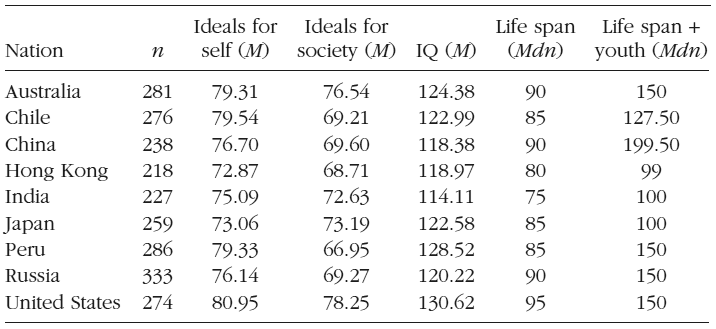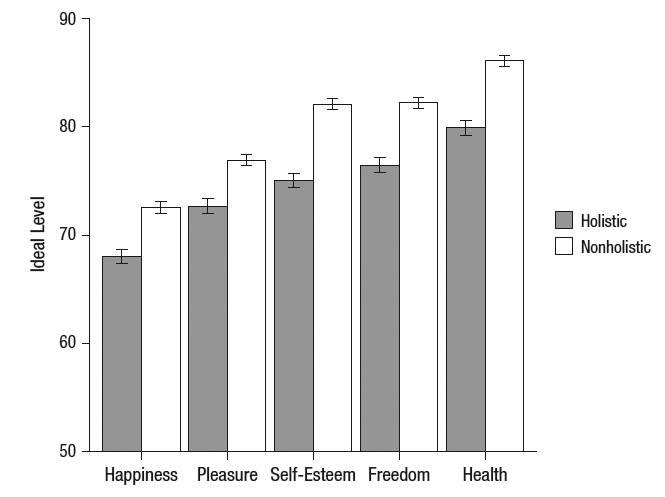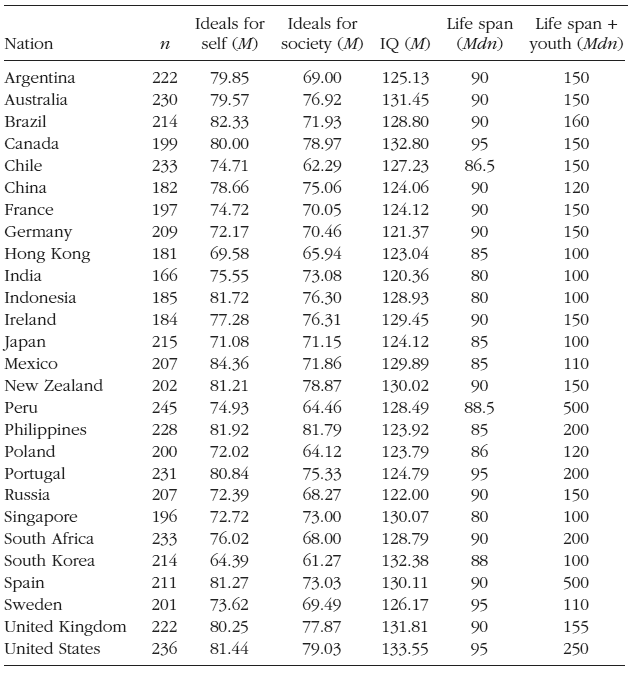Aristotle was right. People do not need eternal life and absolute happiness.
If a person was given access to an unlimited number of benefits - for example, if he can choose the ideal levels of life expectancy, intelligence, freedom, self-esteem, health, pleasure and happiness - what will he choose, what levels? In psychology, there is the principle of maximization , when for the ideal case a person chooses the maximum possible amount of parameters that he considers positive. In accordance with this principle, a person will choose the highest possible levels for each parameter.
In Howard ’s Adaptation of the Human Lifespan to the 21st Century(2000) maximization is described as "the most basic unexplored assumption of human nature." Psychologists have assumed that this is a matter of course: everyone chooses the most favorable conditions. For example, a person has a fundamental desire to save his life (see the theory of controlling the fear of death , the work of Solomon et al., 1991 ), to feel autonomy ( Ryan and Deshi, 2017 ), to be happy ( Kesibir and Diener, 2008 ), to feel security ( Maslow, 1943 ), have self-esteem ( Leary et al., 1995 ), and so on. The maximization principle has an important effect on the economy as a predictor of consumer behavior.
In contrast to maximization, there is the principle of moderation , first described by Aristotle as the "golden mean." He assumes that a person chooses not the maximum amount of each good, but the average between the maximum value and the disadvantage (deficit).
The principle of moderation is part of many Eastern philosophies and religions, such as Buddhism, Confucianism, Hinduism and others. Formed under the influence of these cultural traditions, they developed a holistic view of the existence of man and the world in three "dimensions": contradiction, change and context.
An international group of scientists has published a scientific work that compares the specific influence of the principles of maximization and moderation in different countries and cultures. The authors of the scientific work say that this issue has not been given enough influence before.
The study showed that the maximization principle is not at all as common as is commonly believed. “Our research has shown that people’s sense of excellence is surprisingly modest,” said psychologist Matthew J. Hornsey of the University of Queensland, who leads the study. “People want positive qualities, such as health and happiness, but they do not rule out bad experiences: they want about 75% of good ones.”
Desired life expectancy averaged 90 years, which only slightly exceeds the current average life expectancy. Even when participants imagined that they could take a magic pill guaranteeing eternal youth, the ideal life expectancy increased by only a few decades, up to 120 years in the median(with eternal youth, see table below). And when people were offered to choose the ideal IQ, the average score turned out to be about 130. This is a smart man, but not a genius.
The first study involved 2392 participants from Australia, Chile, China, Hong Kong, India, Japan, Peru, Russia and the United States. Researchers have classified China, Hong Kong, India, and Japan as integral cultures, mainly influenced by religions or philosophies that emphasize a holistic world view. Accordingly, Australia, Chile, Peru, Russia and the United States are classified as non-holistic cultures.
Using a scale from 0 (none) to 100 (maximum), participants indicated their ideal level of health, individual freedom, happiness, pleasure, and self-esteem in the questionnaire. They used the same scale to evaluate ideal levels of social characteristics, such as morality, equality of opportunity, technological progress, and national security.
In general, participants generally rated their ideal levels of individual characteristics by about 70–80%, although there were some differences. For example, many more participants preferred to maximize health than maximize happiness. The ideals of the participants turned out to be relatively modest for both intellect and longevity, even when there were no level limits.
The table shows the results of the survey. The last column corresponds to the desired longevity while preserving youth (median average), the penultimate - without preserving youth.

The survey also showed that representatives of “holistic” (holistic) cultures — that is, those who value the three aforementioned principles of contradiction, change and context — were constantly choosing ideal indicators lower than non-holistic cultures.

The second study with 5,650 participants in 27 countries showed similar results.

It seems that the principle of ideal maximization works only in theory, but not in practice. Accordingly, it makes sense to adjust the economic consumption patterns. “This principle of maximization permeates many well-known philosophical and economic theories,” said Hornsey. “But our data suggests that people have much more complex, mixed notions of perfection that encompass both light and darkness.”
The scientific article was published on June 11, 2018 in the journal Psychological Science (doi: 10.1177 / 0956797618768058).
In Howard ’s Adaptation of the Human Lifespan to the 21st Century(2000) maximization is described as "the most basic unexplored assumption of human nature." Psychologists have assumed that this is a matter of course: everyone chooses the most favorable conditions. For example, a person has a fundamental desire to save his life (see the theory of controlling the fear of death , the work of Solomon et al., 1991 ), to feel autonomy ( Ryan and Deshi, 2017 ), to be happy ( Kesibir and Diener, 2008 ), to feel security ( Maslow, 1943 ), have self-esteem ( Leary et al., 1995 ), and so on. The maximization principle has an important effect on the economy as a predictor of consumer behavior.
In contrast to maximization, there is the principle of moderation , first described by Aristotle as the "golden mean." He assumes that a person chooses not the maximum amount of each good, but the average between the maximum value and the disadvantage (deficit).
The principle of moderation is part of many Eastern philosophies and religions, such as Buddhism, Confucianism, Hinduism and others. Formed under the influence of these cultural traditions, they developed a holistic view of the existence of man and the world in three "dimensions": contradiction, change and context.
An international group of scientists has published a scientific work that compares the specific influence of the principles of maximization and moderation in different countries and cultures. The authors of the scientific work say that this issue has not been given enough influence before.
The study showed that the maximization principle is not at all as common as is commonly believed. “Our research has shown that people’s sense of excellence is surprisingly modest,” said psychologist Matthew J. Hornsey of the University of Queensland, who leads the study. “People want positive qualities, such as health and happiness, but they do not rule out bad experiences: they want about 75% of good ones.”
Desired life expectancy averaged 90 years, which only slightly exceeds the current average life expectancy. Even when participants imagined that they could take a magic pill guaranteeing eternal youth, the ideal life expectancy increased by only a few decades, up to 120 years in the median(with eternal youth, see table below). And when people were offered to choose the ideal IQ, the average score turned out to be about 130. This is a smart man, but not a genius.
The first study involved 2392 participants from Australia, Chile, China, Hong Kong, India, Japan, Peru, Russia and the United States. Researchers have classified China, Hong Kong, India, and Japan as integral cultures, mainly influenced by religions or philosophies that emphasize a holistic world view. Accordingly, Australia, Chile, Peru, Russia and the United States are classified as non-holistic cultures.
Using a scale from 0 (none) to 100 (maximum), participants indicated their ideal level of health, individual freedom, happiness, pleasure, and self-esteem in the questionnaire. They used the same scale to evaluate ideal levels of social characteristics, such as morality, equality of opportunity, technological progress, and national security.
In general, participants generally rated their ideal levels of individual characteristics by about 70–80%, although there were some differences. For example, many more participants preferred to maximize health than maximize happiness. The ideals of the participants turned out to be relatively modest for both intellect and longevity, even when there were no level limits.
The table shows the results of the survey. The last column corresponds to the desired longevity while preserving youth (median average), the penultimate - without preserving youth.

The survey also showed that representatives of “holistic” (holistic) cultures — that is, those who value the three aforementioned principles of contradiction, change and context — were constantly choosing ideal indicators lower than non-holistic cultures.

The second study with 5,650 participants in 27 countries showed similar results.

It seems that the principle of ideal maximization works only in theory, but not in practice. Accordingly, it makes sense to adjust the economic consumption patterns. “This principle of maximization permeates many well-known philosophical and economic theories,” said Hornsey. “But our data suggests that people have much more complex, mixed notions of perfection that encompass both light and darkness.”
The scientific article was published on June 11, 2018 in the journal Psychological Science (doi: 10.1177 / 0956797618768058).
